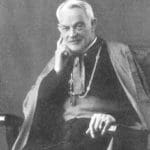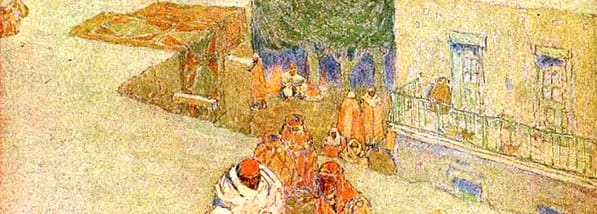THE CHOICE OF NAZARETH
“ And He came and dwelt in a city called Nazareth, that it might be fulfilled what was said by the Prophet, that He shall be called a Nazarene.”
Matthew 2:23
1. St. Matthew has chosen almost all his incidents of the Nativity to show the fulfillment of prophecy. We know from St. Luke that the Annunciation took place at Nazareth; but after that the house must have been given up, and Bethlehem, being the city of David, must have seemed to her and to St. Joseph the most fitting place in which the Son of David should be brought up. But other human reasons drove them from Bethlehem, and the Angel’s warning confirmed the conclusion; there was then little choice but to go back to their old abode, and let God work out the rest. Thus another prophecy was to be fulfilled: Our Lord was to be born at Bethlehem, but He was to be called a Nazarene. On the cross, long after, our Lord was not to be called: “Jesus of Bethlehem, King of the Jews,” for that would have had something of honour and of title about it; but “Jesus of Nazareth, King of the Jews,” was altogether too absurd and contradictory. Thus does God play with the prejudices of men.
 2. It is well to notice how these men had deluded themselves in this matter. They had interpreted many prophecies aright. They had identified the Messiah in many points. They had known He would be born in Bethlehem. But on their own confession they had failed here. “Search the Scriptures,” we find them saying later, “and see that out of Galilee a prophet riseth not.” And again, on another occasion they asked: “Can any good come out of Nazareth?” Yet St. Matthew gives us the prophecy which they could have known as well as he, which was as explicit as any other, that “He shall be called a Nazarene.” How was it that these keen students of the Scripture, above [all] these searchers into prophecy, failed to discover this one? We may answer this as we would answer another: How was it that they failed, in spite of all their study, to recognize our Lord at all? How is it that, throughout all time, so many recognize so much of truth as serves their purpose, but the whole truth they will not, and therefore do not see?
2. It is well to notice how these men had deluded themselves in this matter. They had interpreted many prophecies aright. They had identified the Messiah in many points. They had known He would be born in Bethlehem. But on their own confession they had failed here. “Search the Scriptures,” we find them saying later, “and see that out of Galilee a prophet riseth not.” And again, on another occasion they asked: “Can any good come out of Nazareth?” Yet St. Matthew gives us the prophecy which they could have known as well as he, which was as explicit as any other, that “He shall be called a Nazarene.” How was it that these keen students of the Scripture, above [all] these searchers into prophecy, failed to discover this one? We may answer this as we would answer another: How was it that they failed, in spite of all their study, to recognize our Lord at all? How is it that, throughout all time, so many recognize so much of truth as serves their purpose, but the whole truth they will not, and therefore do not see?
3. At the same time it is to be said in their defense that this prophecy quoted by St. Matthew is not clear. As some Fathers say, we should search in vain to find his words in any prophet’s work. But probably what is meant is that the word “Nazarene” should be taken in its common sense at that time, which was a sense of contempt; to be called a Nazarene was to be demeaned, as a Greek would have been demeaned by being called a Boeotian…as in America one might be called “[the “n” word].” So St. Matthew sums up in the word “Nazarene” those many prophecies which had described our Lord as “despised, rejected, the outcast of the people”; just those which the Scribes and Pharisees had not found to their liking and had therefore eliminated from their concept of Jesus Christ our Lord.
Summary Meditation Points:
- “Jesus of Nazareth,” a title, “to the Jews a stumbling block and to the Gentiles folly, but to them that believe Christ the power of God and the glory of God.”
- “Jesus of Nazareth,” a title which the Jews did not relish, and therefore a title which they failed to recognize.
- “ Jesus of Nazareth,” a title beloved by Our Lord Himself, because it made Him “the despised, the rejected.”
 Editor’s Note: This meditation is from Archbishop Alban Goodier’s “The Prince of Peace” (1913).
Editor’s Note: This meditation is from Archbishop Alban Goodier’s “The Prince of Peace” (1913).





